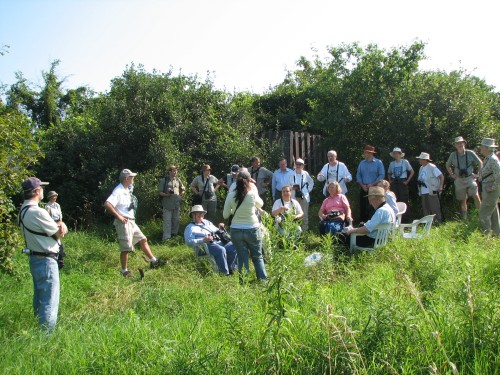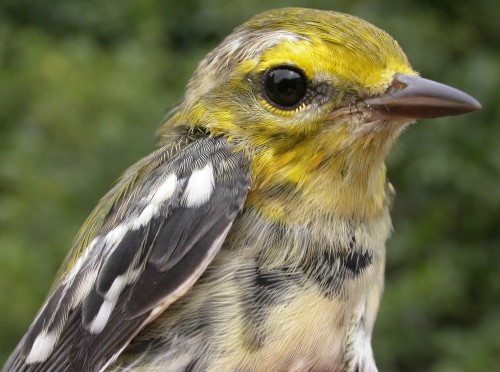Bander-in-charge:
Marcel Gahbauer, Marie-Anne Hudson, Barbara Frei
Assistants: Averill Craig, Jean Demers, Isabel Julian, Gay
Gruner, Betsy Mcfarlane, Barbara MacDuff, Chris Murphy, Clémence Soulard
Notes:
July was a month of heat, humidity and
storms! Despite the weather, we had 12 days of observation, 4 days of
banding, and several days of site maintenance and prep work for the
upcoming fall season. The number of species seen during each visit
ranged between 23 and 42, with the average hovering around 32. The
total number of species seen over the entire summer, however, stands at
65 (61 seen this month). One new species has been added to the 2006
list: a Marsh Wren was heard burbling away on the far side of
Stoneycroft during the census walk on the day of the Bird Protection
Quebec field trip (more on that below). Over the course of July, 15
species were added to this summer's list: American Black Duck,
Red-tailed Hawk, Merlin, Chimney Swift, Yellow-bellied Sapsucker, Least
Flycatcher, Barn Swallow, Common Raven, House Wren, Marsh Wren,
Tennessee Warbler, Black-throated Green Warbler, Ovenbird, Savannah
Sparrow and White-throated Sparrow.
In terms of unusual species at MBO, a Merlin
zipped over the D nets being chased by an Eastern Kingbird, and a House
Wren was making a fuss while its hatch-year companion was stuck in D2.
We had breeding House Wrens last year, but until now there’s barely been
any sign of them! It’s always surprising to have young birds pop up
that have clearly been raised on site when there hasn’t been any sign of
breeding activity.
The Bird Protection Quebec field trip was a
wonderful experience. We were lucky enough to have beautiful weather
for our 30 visitors. Unfortunately, beautiful weather for birders is
not the same as beautiful weather for banders. The bright sunshine made
the nets stick out like sore thumbs, and the heat kept bird movement to
a minimum, making for a catch of 1 lonely little Song Sparrow. But at
least we weren’t left completely empty handed! The other 3 days of
banding in July proved to be more productive, with 26 birds banded
representing 10 species, 3 of which were new for 2006: House Wren,
Black-throated Green Warbler, and Ovenbird. The after-hatch year male
Black-throated Green Warbler, as well as a heavily-moulting after-hatch
year male Tennessee Warbler (netted but not banded), are sure signs that
fall migration is gearing up! Factoring in owls (not included in the
table above), we banded our 6000th bird last week - a Song Sparrow, as
several of our other milestone birds have been. We can’t wait to
see what we’ll be banding over the coming weeks!
This
month's top 10 [last month's rank in
brackets]
|
# individuals banded |
mean # individuals
observed daily |
|
Song Sparrow (10) |
Red-winged Blackbird (18)
[1] |
|
Swamp Sparrow (4) |
Song Sparrow (16)
[6] |
|
Rose-breasted Grosbeak (3) |
American Goldfinch (16)
[2] |
|
Yellow Warbler (3) |
American Robin (12)
[-] |
|
Least Flycatcher (1) |
Cliff Swallow (12)
[-] |
|
House Wren (1) |
Cedar Waxwing (8)
[5] |
|
Black-throated Green Warbler
(1) |
Common Grackle (8)
[-] |
|
Ovenbird (1) |
Tree Swallow (6)
[4] |
|
Indigo Bunting (1) |
Yellow Warbler (5)
[3] |
|
Baltimore Oriole (1) |
Northern Cardinal (4)
[-] |
|
There
was a lot of movement in this month’s top 10. The Red-winged Blackbirds
still managed to maintain their grip on the number 1 spot despite their
average numbers dropping by about half. The abundance of young Song
Sparrows has propelled them up the list to number 2. The Yellow
Warblers have almost disappeared, dropping from the number 3 spot to
number 9. Four new species have climbed into the top 10: American
Robin, which are beginning to flock; Cliff Swallow, which are breeding
at the nearby weather station and come to MBO to feed; Common Grackle,
which have begun to migrate over MBO in flocks; and Northern Cardinal,
which have lots of young ones bouncing around the site.
|

About 30 members of Bird Protection Quebec came for a visit on
July 29, 2006. Though only 1 bird was netted, everyone seemed
to have a great time walking the census route and doing general
observations.
(Photo by Barbara Frei)
|


